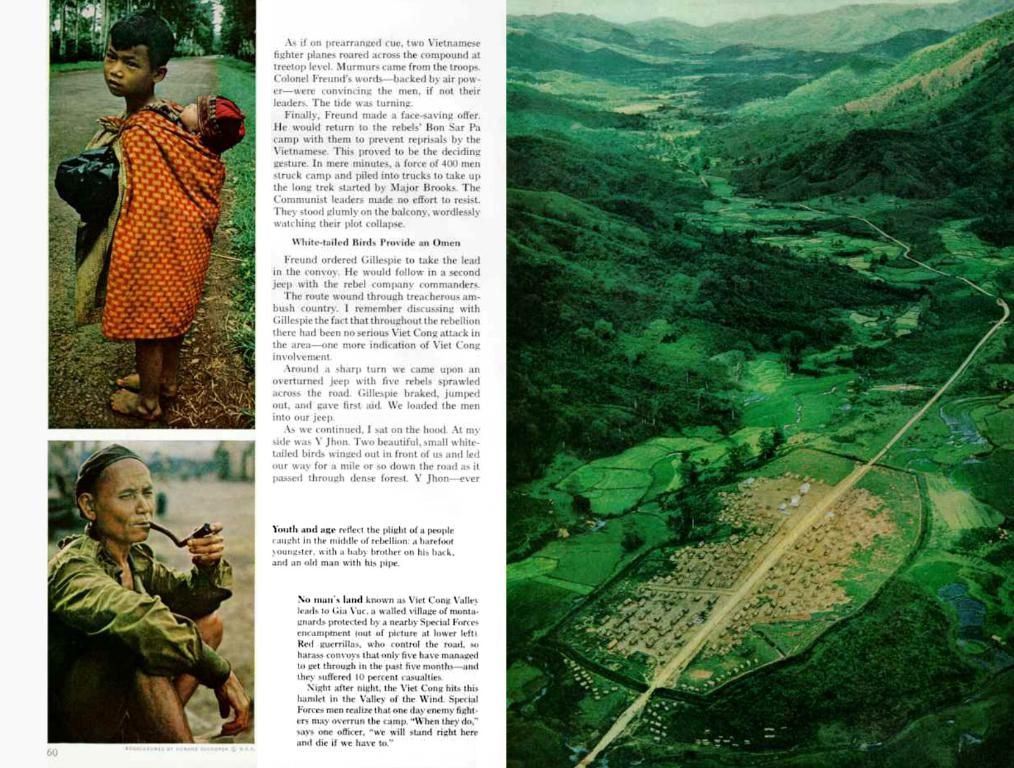The Ambivalent Political Landscape of Georgia
Georgia Legislature Enacts Foreign Agents Law, Shifting Focus Towards Upcoming Elections
Amidst the tumultuous political landscape of Georgia, a nation embroiled in ongoing strife, the former President, Mikheil Saakashvili, recently commented on the present political situation from his prison cell through a video link during a judicial proceeding on May 22. Addressing the Georgian Dream-dominated government, he accused them of leading the country into a chasm. To reverse this downward spiral and steer Georgia towards European Union (EU) accession, he suggested opposition elements needed to consolidate their forces.
"Mates, when there's a rift within parties, it's the nation that we lose," he said, as per a report distributed by 1TV, Georgia's national broadcaster. Looking towards the parliamentary elections in the fall, Saakashvili relayed a message to voters who have historically supported the government.
"Separate yourself from this flock, don't be their pawns, and let's all contemplate together the future of Georgia," he said, expressing his party, the United National Movement (UNM), was prepared to " yield any concessions" to foster a united opposition bloc.
Whether Saakashvili's vision of a UNM-led opposition alliance materializes remains uncertain. While rumblings suggest such a coalition is essential to depose Georgian Dream, various political actors are grappling with resolving their differences to construct a unified front for the upcoming vote.
As the Georgian Dream coalition, inexorably, rams through its 'foreign agents' law, opposition activists appear to be anxiously awaiting the international community's response before making their next moves. Ominous questions hang over the new legislation, with many fearing its enactment will be even more repressive than the original bill.
Parliament is due to override a presidential veto of the law on May 28. The measure has stirred condemnation from the EU's legal advisors. In its highly anticipated review, released on May 21, the Venice Commission strongly urged lawmakers to revoke the legislation, warning of disastrous consequences for freedoms of association, expression, privacy, public participation, and non-discrimination.
Things took a bitter turn the following day, as Georgian Prime Minister Irakli Kobakhidze dismissively slammed the commission's findings, accusing it of lacking professional decorum. This is a stark contradiction to the party's collaboration with the Venice Commission as recently as last fall.
The US and EU have hinted at imposing sanctions on Georgian Dream members, should the legislation come into force. These potential measures include visa bans for politicians instrumental in passing the law, as well as reporting requirements on Chinese and Russian influence in Georgia. On May 22, US Secretary of State Antony Blinken called the 'foreign agents' law "Moscow's playbook in disguise," hinting at forthcoming retaliation.
Despite the swirling debates and power struggles among opposition entities, many believe that to defeat the Georgian Dream, a viable alternative must be presented to voters—one that goes beyond the familiar choices of voting for Georgian Dream or the UNM.
According to a recent survey, an overwhelming majority of Georgians want their country to join the EU. If this election were turned into a referendum advocating for EU integration, a united opposition could potentially secure 80% of the vote. However, should the divisions continue to widen and a clear alternative not emerge, Georgian Dream stands a strong chance of securing yet another election victory.
As the people of Georgia face tough times ahead, they can only watch and wait to see what the future holds. Will a united opposition alliance emerge to challenge the ruling party and restore the country's path towards the EU, or will Georgian Dream continue its relentless march towards total dominance?
- The ongoing political strife in Georgia has raised concerns about the country's future, particularly its journey towards European Union (EU) accession.
- Amidst the volatile political landscape, various political actors are grappling with resolving their differences to construct a unified opposition front against the Georgian Dream coalition.
- The international community, such as the EU and the US, are closely monitoring the political developments in Georgia, particularly the 'foreign agents' law, with potential sanctions on Georgian Dream members being discussed.
- As the United National Movement (UNM) works towards consolidating forces and forming a coalition, general news outlets cover the news of car-accidents, fires, and crime-and-justice, adding to the nation's worries.
- With many Georgians expressing a strong desire for their country to join the EU, migration patterns may shift as people seek better opportunities in neighboring countries or beyond, influenced by policy-and-legislation and war-and-conflicts in the region.
- As the people of Georgia await the upcoming parliamentary elections and the emergence of a clear alternative, they continue to watch the developments unfold, hoping for a brighter future that steers the nation away from its troubled past.








